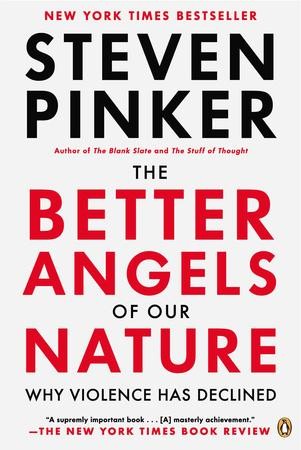- Rating
- Category
- non-fiction
- Read
- 2017-11-22
- Pages
- 832
Highly engaging through the first half then I steadily lost interest as it progressed. Like many books of this type: I’m really glad someone wrote it, but I didn’t necessarily need the whole thing personally.
Also somewhat obvious trigger warning: it deals with a lot of violence :/
“In an influential article called “Crime as Social Control,” the legal scholar Donald Black argued that most of what we call crime is, from the point of view of the perpetrator, the pursuit of justice.”
“The Old Testament tells us to love our neighbors, the New Testament to love our enemies. The moral rationale seems to be: Love your neighbors and enemies; that way you won’t kill them. But frankly, I don’t love my neighbors, to say nothing of my enemies. Better, then, is the following ideal: Don’t kill your neighbors or enemies, even if you don’t love them.”
“Perhaps the least contentious claim about human nature is that humans are apt to have sex under a wider range of circumstances than those in which they are capable of bringing up the resulting babies.”
“The art of politics, Tetlock points out, is in large part the ability to reframe taboo tradeoffs as tragic tradeoffs (or, when one is in the opposition, to do the opposite). A politician who wants to reform Social Security has to reframe it from “breaking our faith with senior citizens” (his opponent’s framing) to “lifting the burden on hardworking wage-earners” or “no longer scrimping in the education of our children.” Keeping troops in Afghanistan is reframed from “putting the lives of our soldiers in danger” to “guaranteeing our nation’s commitment to freedom” or “winning the war on terror.” The reframing of sacred values, as we will see, may be an overlooked tactic in the psychology of peacemaking.”
